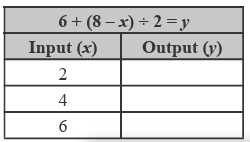ORDER OF OPERATIONS USING PEMDAS WORKSHEET
Subscribe to our ▶️ YouTube channel 🔴 for the latest videos, updates, and tips.
PEMDAS rule can be used to simplify complicated numerical expressions with more than operations.
Very simply way to remember PEMDAS rule!
P ----> Parentheses
E ----> Exponent
M ----> Multiplication
D ----> Division
A ----> Addition
S ----> Subtraction
Problem 1 :
a) (5 - 2)2 - 6
b) 3 × 4 + 52
c) 4 × 32 - (3 + 2)2
d) 3 - 22 ÷ 2 + 1
e) (5 - 2)2 - 22
f) (15 - 32) ÷ 3
g) 5 × 22 + 2 × 32
h) 5 × (22 + 2) + 6
i) 35 - 3 × 23 + 7
Solution :
a)
|
= (5 - 2)2 - 6 = 32 - 6 = 9 - 6 = 3 |
Parentheses Exponent Subtraction |
b)
|
= 3 × 4 + 52 = 12 + 25 = 37 |
Exponent Addition |
c)
|
= 4 × 32 - (3 + 2)2 = 4 × 32 - 52 = 4 × 9 - 25 = 36 - 25 = 11 |
Parentheses Exponent Multiplication Subtraction |
d)
|
= 3 - 22 ÷ 2 + 1 = 3 - 4 ÷ 2 + 1 = 3 - 2 + 1 = 3 - 1 = 2 |
Exponent Division Addition Subtraction |
e)
|
= (5 - 2)2 - 22 = 32 - 22 = 9 - 4 = 5 |
Parentheses Exponent Subtraction |
f)
|
= (15 - 32) ÷ 3 = 15 - 9 ÷ 3 = 15 - 3 = 12 |
Parentheses, Exponent Division Subtraction |
g)
|
= 5 × 22 + 2 × 32 = 5 × 4 + 2 × 9 = 20 + 18 = 38 |
Exponent Multiplication Addition |
h)
|
= 5 × (22 + 2) + 6 = 5 × 6 + 6 = 30 + 6 = 36 |
Parentheses, Exponent Multiplication Addition |
i)
|
= 35 - 3 × 23 + 7 =35 - 3 × 8 + 7 =35 - 24 + 7 = 35 - 17 = 18 |
Exponent Multiplication Addition Subtraction |
Problem 2 :
Replace * with either +, -, ×, ÷ or ÷ to make a true statement :
a) (18 * 2) ÷ 10 = 2
b) (10 * 3) * 7 = 1
c) 15 * 3 + 2 * 5 = 15
Solution :
a)
(18 * 2) ÷ 10 = 2
By replacing * as +, we get
(18 + 2) ÷ 10 = 2
20 ÷ 10 = 2
2 = 2 (true)
b)
(10 * 3) * 7 = 1
By replacing * as -, we get
(10 - 3) * 7 = 1
7 * 7 = 1
By replacing * as ÷, we get
7 ÷ 7 = 1
1 = 1 (true)
c)
15 * 3 + 2 * 5 = 15
By replacing * as ÷, we get
15 ÷ 3 + 2 * 5 = 15
5 + 2 * 5 = 15
By replacing * as ×, we get
5 + 2 × 5 = 15
5 + 10 = 15
15 = 15 (true)
Problem 3 :
Insert brackets into the following to make them true :
a) 8 + 4 ÷ 2 + 2 = 3
b) 5 + 3 × 6 - 10 = 38
c) 13 + 5 ÷ 5 + 4 = 2
Solution :
a)
8 + 4 ÷ 2 + 2 = 3
(8 + 4) ÷ (2 + 2) = 3
12 ÷ 4 = 3
3 = 3 (true)
b)
5 + 3 × 6 - 10 = 38
(5 + 3) × 6 - 10 = 38
8 × 6 - 10 = 38
48 - 10 = 38
38 = 38 (true)
c)
13 + 5 ÷ 5 + 4 = 2
(13 + 5) ÷ (5 + 4) = 2
18 ÷ 9 = 2
2 = 2 (true)
Problem 4 :
A woman has $255 in her purse. She gives $35 to each of her five children. How much money does she have left?
Solution :
Amount she has left in her purse
Amount given for each children = $35
Number of children they get = 5
Amount she have left = 255 - (35 x 5)
= 255 - 175
= 80
Problem 5 :
The equation shown in the table can be used to find the output when the input is 2, 4, and 6.

Which numbers complete the table?
a) 6, 5, 4 b) 8, 9, 10 c) 9, 8, 7 d) 14, 12, 10
Solution :
When x = 2
y = 6 + (8 - x) ÷ 2
Applying x = 2, we get
y = 6 + (8 - 2) ÷ 2
= 6 + 6 ÷ 2
= 6 + 3
= 9
When x = 4
y = 6 + (8 - x) ÷ 2
Applying x = 4, we get
y = 6 + (8 - 4) ÷ 2
= 6 + 4 ÷ 2
= 6 + 2
= 8
When x = 6
y = 6 + (8 - x) ÷ 2
Applying x = 6, we get
y = 6 + (8 - 6) ÷ 2
= 6 + 2 ÷ 2
= 6 + 1
= 7
Problem 6 :
Using Order of Operations (PEMDAS) solve the expression.
(4 + 20) ÷ 2 + 6
a) 4 b) 3 c) 18 d) 10
Solution :
= (4 + 20) ÷ 2 + 6
First simplify the bracket.
= 24 ÷ 2 + 6
= 12 + 6
= 18
So, option c is correct.
Problem 7 :
Find the value of y, when x = 4
(x + 4) x 5 = y
a) 4 b) 35 c) 24 d) 40
Solution :
Applying x = 4, we get
y = (4 + 4) x 5
= 8 x 5
= 40
So, option d is correct.
Problem 8 :
Davi has 5 times as many hats as Kwan. Davi has 20 hats. Which can be used to find the number of hats Kwan has?
a) 5 + h = 20; h = 15 b) 5 × h = 20; h = 4
c) 5 × 20 = h; h = 100 d) 5 + 20 = h; h = 25
Solution :
Let k be the number of hats Kwan has.
5 x k = number of hats Davi has
Which is option c is correct.
Subscribe to our ▶️ YouTube channel 🔴 for the latest videos, updates, and tips.
Kindly mail your feedback to v4formath@gmail.com
We always appreciate your feedback.
About Us | Contact Us | Privacy Policy
©All rights reserved. onlinemath4all.com

Recent Articles
-
90 Degree Clockwise Rotation
Jan 01, 26 06:58 AM
90 Degree Clockwise Rotation - Rule - Examples with step by step explanation -
US Common Core K-12 Curriculum Algebra Solving Systems of Equations
Jan 01, 26 04:51 AM
US Common Core K-12 Curriculum - Algebra : Solving Systems of Linear Equations -
Solving the HARDEST SAT Math Questions ONLY using Desmos
Dec 31, 25 05:53 AM
Solving the HARDEST SAT Math Questions ONLY using Desmos
